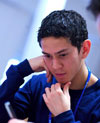 Cesar Ceballos,
Cesar Ceballos,
BMS Alumnus,
PhD completed in August 2012,
MSc Utrecht University,
MSc Universidad de los Andes, Colombia
There are two aspects which I consider important for choosing a PhD program in mathematics: a top academic and research environment, and a nice location. I chose Berlin because it offers both.
I joined the Berlin Mathematical School as a Phase II student in the discrete geometry group of Prof. Günter M. Ziegler, one of the world's leading groups in combinatorial and discrete geometry. The academic and research environment of this group, and in general of the Berlin Mathematical School, has very high standards at the level of top universities worldwide.
The academic environment of the BMS is very competitive, but at the same time very friendly. In my personal experience, I had very fruitful collaborations with other BMS members. One of the aspects that I liked the most are the 'BMS Friday Colloquia' which take place every second Friday. This is an event where distinguished mathematicians from all around the world are invited to give a talk, and where you have the opportunity to meet and talk to other BMS members.
As a Phase II student, I attended one or two courses per semester, and organized and attended several research seminars. I also participated in several Soft-Skills Seminars, including mathematical writing, presentation training, and a mathematical graphics workshop, all of which I found extremely useful. Although no teaching is required, it is possible to become an assistant for some BMS courses. During my stay in Berlin, the BMS also supported the students in organizing conferences and social activities.
Berlin Mathematical School also offers great opportunities for students who already have a Master's Degree. Those students are usually admitted to the Phase II program, which focuses mainly on research, for a period of 2-3 years. This is an ideal period of time and much less compared to other universities where it might take more than five years to finish a PhD. This option was ideal for me.
The BMS and one of its research units provided me with financial support for numerous conferences, several German language courses, research stays in Canada, Spain and the USA, and financial support for my family and son. The staff of the BMS One-Stop Office was always extremely helpful and ready to solve any problem or to answer any enquiry I had. For example, they arranged housing for me and helped with all visa issues and extensions.
Before being accepted onto the program, selected students usually get an invitation to participate in the 'BMS Days'. This event is a two-day meeting where a group of prospective students have the opportunity to learn a bit more about the program and to talk to possible future supervisors. During these days, you also have the chance to visit the city and talk to current BMS students in the evening while having a few beers!
Besides mathematics, Berlin is a great multi-cultural and historical city with many things to offer. In particular, I liked the diversity of the city and the nightlife with lots of Latin-American options, or the various festivals such as the 'Carnival of Cultures of Berlin' and the 'Berlinale International Film Festival'. The diverse and international atmosphere of Berlin is ideal for foreign students. The mathematics community of the BMS is also very open and has a positive international atmosphere which is ideal for making lots of friends. The BMS also organizes and supports plenty of social activities such as car racing, the 'BMS Cooking Day', sporting activities, and language conversation groups among others.
My time in Berlin was very much enjoyable and productive. I had a lot of fun doing mathematics in a wonderful community and enjoyed many other aspects of my life there.
published in December 2012
Update 2014: Cesar is a Banting Postdoctoral Fellow at York University, Canada.
Update 2016: He is a postdoctoral fellow at University of Vienna, Austria.





















